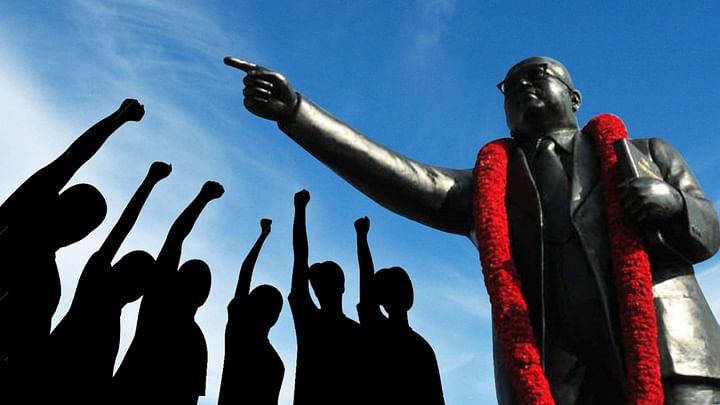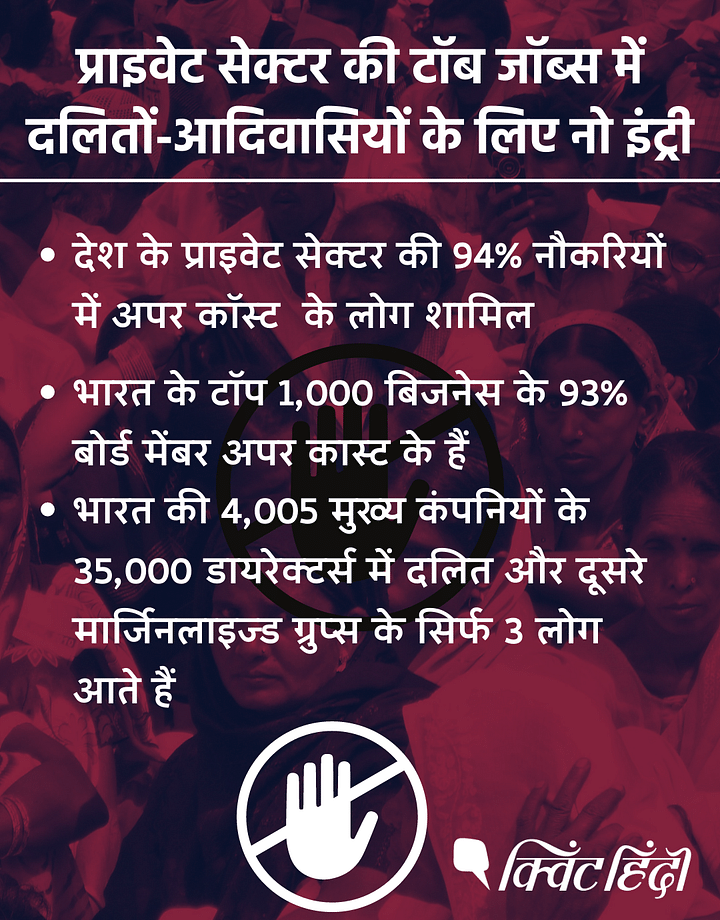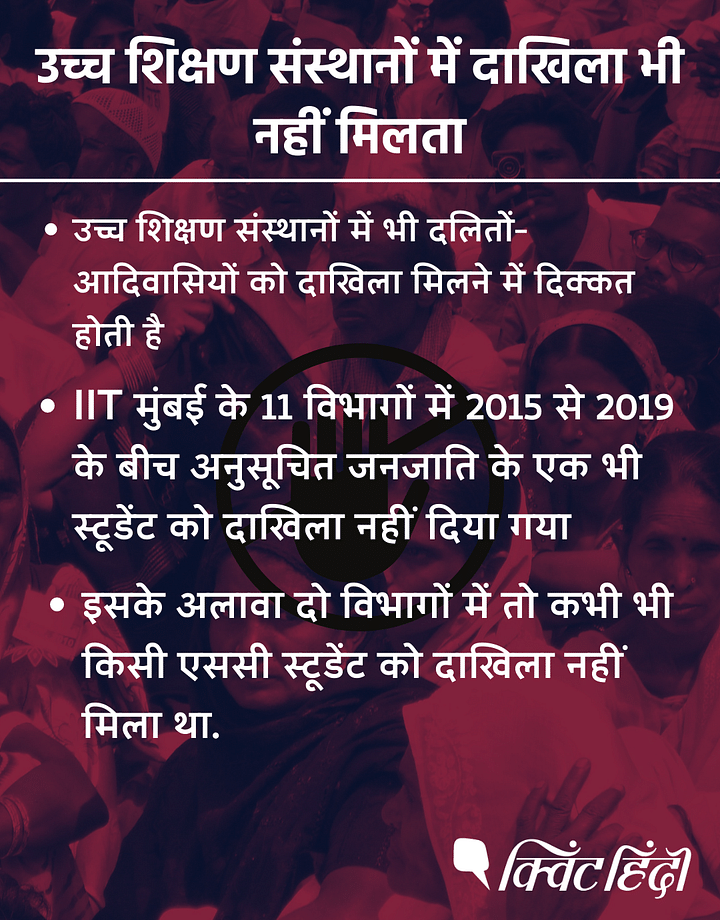Controversy: Untouchability of ‘upper cast’ works mysteriously in cities, corporate
There is a separate toilet-lift for office boy, pantry boy, cleaning workers, separate eating area.
Published:

The Dalit activist controversy at Google has once again sparked discussion on the status of Dalits in the corporate world and urban space. Since many suppressed layers of multinational and corporate culture have been torn apart. The dark truths behind the glitter have been illuminated. It is generally believed that economic liberalization has created opportunities for all, but to know the truth one has to go beyond caste superiority and arrogance of authority. It has to be understood where the Dalit-Adivasis are actually lurking in the corporate culture. Well, we will consider this further, but first we have to try to understand the reason behind these conditions.
Google was accused of canceling the program of a Dalit activist. It was said that the program was canceled due to his being a Dalit.
No entry for dalits-tribals in private sector tob jobs
We continue to defy caste brazenly, but the truth is that the upper castes dominate the top jobs in the private sector. A few years back, JNU professor Surinder Singh Jodkha did a study. It was told that Brahmins and Banias are sitting in 94% of the private sector jobs of the country. Similarly, in 2012, some Canadian researchers, after a study, said that 93% of the board members of India’s top 1,000 businesses are from the upper caste, which accounts for only 15% of the country’s population. Similarly, a US study on 4,005 major companies in India shows that out of 35,000 directors in companies, Dalits and only 3 from other marginalized groups. Journalist and activist Aakar Patel has published a list of which caste people occupy the highest positions in 30 big companies. Obviously, only the upper castes.

This is because Dalit Adivasis and Muslims also find it very difficult to get jobs. In 2009, Sukhdev Thorat and Paul Atwell did a social experiment which was also featured in the Economic and Political Weekly. In this it was found that people with uppercast surname are more likely to be called for interview while Muslims and Dalit people are less. Even if the qualification of both is same.
Not even getting admission in higher educational institutions
How to get top jobs in private sector, if they will have trouble in pursuing higher education. The socio-economic reasons are there, but even in higher educational institutions, Dalits and tribals face difficulty in getting admission. Despite that they get reservation. In December 2020, when the Ambedkar Periyar Phule Study Circle filed a right to information application, it was found that not a single ST student was admitted between 2015 and 2019 in 11 departments of IIT Mumbai. Apart from this, no SC student ever got admission in two departments.

Similarly, discrimination is also faced when getting admission, or getting jobs. This is clear from the numerous memoirs of Dalit activists. The suicide death of Payal Tadvi or Rohith Vemula was a result of the reactions of the upper caste group in the higher educational institutions. If you want to see the reality of corporate, then read Dalit activist, writer and feminist Christina Dhanraj’s article – What in Means to Be a Dalit Woman in Corporate India . In this article, Christina wrote that despite working in a multinational company, she faced caste discrimination.
Where are Dalit-Adivasis lurking in the corporate culture?
Yes, the special thing with Christina’s memoir is that the author is an educated English speaker. She knows how to speak her mind, but how can one imagine the condition of people in the corporate and urban space who have no representation or voice. They do not know English, nor are they highly educated. Not only do they face caste discrimination, they also have to face boycott and untouchability. This boycott and untouchability have their own practices and their own methods. Upper caste untouchability works very differently in the urban and corporate space. In all formal workspaces, IT, media companies, FMCG, untouchability is spread in a very veiled, cryptic manner. Because the definition of untouchability for the urban upper caste is very simple, literal.
That’s why untouchability doesn’t work so brazenly in urban office spaces. It moves in a very different way.
Dalit labor is generally hired as contract workers in urban office spaces. That’s why they have no safety net, no insurance or social protection. It happened even a little up and down that the job was lost. Apart from this, office spaces are so forbidden that most Dalit workers are unable to even get around that ‘touchable’ place. That is why any kind of physical distance does not have to be enforced forcibly.
And there’s a totally different way of boycotting and untouchability.
Actually the need of Bahujan is everywhere. Even in the corporate world. Because after all, who will do all the minor work of the upper cast – making tea, or cleaning the office-restrooms. They cannot do upper cast. Therefore, only Bahujans are kept for this. As Thorat wrote in his study, decades of discrimination have confined Dalits to low-income jobs. If 90% of Dalits in rural areas work in farms, then in urban areas they work in lower positions in private sector jobs. Like Office Boy, Pantry Boy, Toilet Cleaners, Safai Karamcharis.
Here’s how untouchability works… For them there is a separate toilet, a separate lift, a separate place to drink water. Sometimes the utensils are also different. Somewhere they sit on the stairs, somewhere outside the washroom. Often they also have separate places to eat. Sometimes they eat on the stairs, sometimes in the store room. Sit alone in the canteen, or at their assigned place. In the basement, away from the rest of the staff. They are hesitant to eat together in the midst of everyone, because they often feel like uninvited guests. Apart from this, the swipe machine is also different in many places. Sometimes his location is also away from the location of upper cast employees. The architecture of these places is built on several acres of land but there is no workstation for cleaning or office staff.
They are not invited to most office functions. Leftover food is often available at parties. In this connection, Neeraj Ghaywan’s Geely Puchhi is remembered in the anthology film Ajibi Dastan, which was released on Netflix last year. The film was based on the Dalit Queer Bharti Mandal and its relationship. Despite being qualified in the factory where Bharti works, she is not able to achieve a high position. How often she eats food sitting alone, and how she is not invited to the birthday party and is only assigned the task of serving cakes.
It’s not that the upper cast doesn’t see this untouchability, but they don’t find it unusual at all. It seems to be part of the heraraki, which is considered spontaneous. But discrimination and exclusion is happening systematically, it has happened. That’s why there is a need to break it systematically.
In 1916, Babasaheb Bhim Rao Ambedkar, in an essay titled Castes in India – Their Mechanism, Genesis and Development, warned that although it is a local problem, it can cause widespread damage. If Hindus migrate to other countries then Indian caste will become a problem of the world. Seeing the Google case, that fear of Babasaheb proves to be correct.



